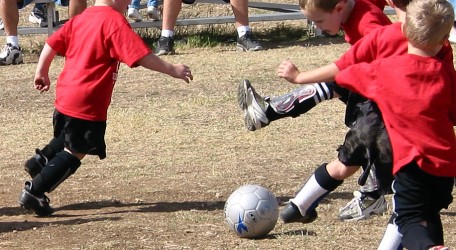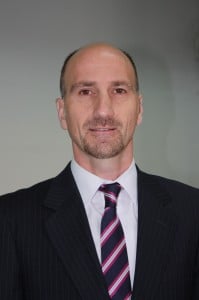
Getting serious about sports
In a country which ranks alarmingly high in the obesity stakes, it is imperative that we not only get people to exercise, but also to have qualified personnel in the field of PE. Josanne Cassar interviews Andrew Decelis, the Director of the Institute for Physical Education and Sports at University
 The Institute for Physical Education (PE) and Sport (IPES) of the University of Malta was established in 2002 with the aim of providing Certificate, Diploma, Degree and Masters Courses and professional development courses in Physical Education and Sport and to carry out research in the same area. The need to have qualified personnel in this area has been felt for a long time, explains Mr. Decelis (pictured).
The Institute for Physical Education (PE) and Sport (IPES) of the University of Malta was established in 2002 with the aim of providing Certificate, Diploma, Degree and Masters Courses and professional development courses in Physical Education and Sport and to carry out research in the same area. The need to have qualified personnel in this area has been felt for a long time, explains Mr. Decelis (pictured).
“Our courses target various areas in the field of physical education and sports. The main course is that organised by the Faculty of Education and serviced by the Institute, which prepares physical education teachers. This course gives a qualified teacher status and is required to teach physical education in schools. Other courses target persons who wish to work or are already working in the fields of coaching, exercise and fitness, sports administration and management. The content of the courses includes physical education and sport pedagogy, sports science, philosophy, sociology and psychology.”
Those who are already working in the field but wish to obtain formal qualifications will be pleased to learn that anyone can apply if he or she is in possession of the qualifications required for that particular course. These vary from a pass in the matriculation certificate together with other specific requirements including a PE proficiency test for undergraduate courses in PE, to SEC/O’ level qualifications for other courses. The maturity clause for persons over 23 years applies for entry into the majority of the courses, giving applicants credit for experience and aptitude besides qualifications. There is no age limit for entry into these courses, but for some courses, applicants must not be less than 18 years of age within 3 calendar months from the commencement of the course. The University of Malta website should be consulted about updates concerning entry requirement.
Do you feel there is enough regulation in Malta for those who are involved in the field of sports and do you think there should be some kind of warrant to ensure a degree of professionalism?
“The aim behind any form of regulation is that of safeguarding the needs of the client and to ensure a high quality service. This aim can only be achieved through education which should be part and parcel of regulation. It’s no use setting regulations unless you provide the right support and training. During the last eight years, the Institute has offered various new courses to cater for the sports sector, and intends to continue offering new ones. One expects the next step to be the introduction of a system that regulates the provision of services in sport, similar to the situation in physical education in schools. Some sport associations have already introduced their own licensing system, which ideally should be in line with European and International standards. It is also hoped that in the near future, these licensing and registration systems are incorporated into a national system with various levels, which is in line with European standards.”
Mr Decelis points out that the Institute is a member of the The European Network of Sport Science, Education & Employment (ENSSEE) which is an international non-profit association for institutions and provides a meeting place for debating and proposing ideas, as well as common initiatives to promote education, training and employment in sport. ENSSEE is following up on the work of AEHESIS, (Aligning a European Higher Educational Structure In Sport Science) a European project concluded a couple of years ago, which was aimed at aligning sports education in Europe. Given that knowledge in sport is evolving continuously, all sports personnel should attend continuous professional development workshops and courses, which should be compulsory for the renewal of licences, something which is already being required by some local associations.
One point which Mr Decelis greatly emphasised is child protection in sports: “this is an area that needs special attention in Malta. Youth sport coaches have a very important role in protecting children and helping them get the best from sport.”
Some might feel that this area of education is not really necessary because it is not a traditional academic subject and “doesn’t get you anywhere” (except for those who want to become PE teachers in schools). This, however, is a misconception. Mr Decelis said that the main job opportunities that have been available during the last twenty years were in PE teaching. However, there are many other opportunities for employment in the field of sport. Sport administration and management posts, exercise and fitness instructors, and coaching posts in various sports are some of the jobs one can find in this sector. Employers need to understand the importance of employing qualified personnel and sport authorities need to enforce it, he added.
Physical Education has been included as an examinable subject at SEC (Ordinary) level since 2004 and it is being offered in almost all local secondary schools. Intermediate PE will soon be introduced in post secondary schools and will bridge the gap between secondary schools and University.
Unfortunately, sports is often the first thing which is dropped as an extra-curricular activity, especially when exam time comes around. What can be done to change this mentality?
“Our culture of putting academic development ahead of holistic development is gradually changing; particularly through the draft of the new curriculum framework published recently, which stresses the development of the whole child and the benefits and overall positive outcomes of physical activity, physical education and sport. Hopefully, this will give physical education the status it deserves and the importance it should be given in schools. Various studies have shown that participation in physical education, physical activity and sport does not have a negative impact on academic performance, and some studies have also shown it might lead to improved grades.”
Mr Decelis went on to say that the Institute has collaborated with various entities and schools on different projects aimed at the promotion of physical activity and sport. “We also believe in evidence-based policy, that is, policy based on local research. Our culture is different from that of other countries. Our children, our schools are all different. Therefore we cannot base our projects on results obtained in other countries. For this reason, the Institute is working on various research projects which could guide policies that increase participation. For any campaign to be successful, it should be aimed at all the stakeholders and not just the parents. According to one of the theories of behaviour change, the ecological theory, it’s not enough to target the individuals, the children, we also need to target all the persons around them, the family, the peers, the school and community environment. All these layers of influence interact. Some researchers have argued that this theory is very useful for understanding the development of obesity in children.”
A national study that is being launched by the Institute with the support of the Health Promotion and Disease Prevention Department focuses on Year 6 children’s lifestyle, physical activity and weight status.
“Physical activity will be measured using objective measures rather than through the use of questionnaires only. The data collected will be filtered using software that identifies time-periods during the day on weekdays and weekends when children are mostly active or sedentary. Interventions can then be planned accordingly. This is called the mal-ta study which stands for Movement, Activity, Lifestyle Tweens (pre-teens) in Action. Other important research projects focus on social inclusion in physical education and sport, teaching co-operation and positive social interaction through physical education and on teachers’ professional development. The teaching that takes place at the Institute is based on the latest research in every area, including our own local research projects.”
- What are the future plans of the Institute with regard to the type of courses offered? What type of person should apply for your courses?
The Institute is planning to launch a part-time Degree course in Sports and Active Lifestyles, probably starting October 2012, and a Masters programme as from the following year. The target public for the evening part-time degree are coaches, administrators or anyone who has an interest in sports. The Masters degree will be targeting mainly PE teachers, and anyone involved in physical activity and sports. Students will be expected to have completed tertiary education at Bachelor level before entering this course. We are also working on other new courses, and discussing collaborations with other foreign universities.
- December 17, 2011 No comments Posted in: Features





